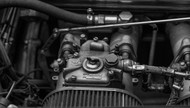Slipped Serpentine Belts: A Common Problem You Need to Know
28th Apr 2023

If you hear a squeaking or squealing sound originating from your vehicle's engine bay when driving, you may be dealing with a slipped serpentine belt. It's an all-too-common problem that affects vehicles. Serpentine belts typically don't just snap. Instead, they slip. Because it's used to control a variety of components, a slipped serpentine belt can affect your vehicle in different ways.
What Are Serpentine Belts?
Serpentine belts are rubber belts that transfer power from a vehicle's engine to various components. Also known as drive belts, they are typically made of reinforced rubber. They consist primarily of rubber that's mixed with steel, nylon or even Kevlar. They are known as "serpentine belts" because of their shape. They are long, slender belts that are reminiscent of serpentines.
Most vehicles have a single serpentine belt, which is used to transfer power to the following components:
- Power steering
- Air conditioning (AC) system
- Alternator
What Causes Serpentine Belts to Slip?
While serpentine belts are durable, they can still slip. A slipped belt means that it's either loose or has fallen off one of the components with which it's used.
Contaminants can cause serpentine belts to slip. There's no filter protecting them from dirt, debris and other contaminants. You can find your vehicle's serpentine belt directly in the engine bay. When exposed to road contaminants, it may slip.
Misalignment can cause serpentine belts to slip. They are connected to components via pulleys. If a serpentine belt isn't properly aligned with one or more pulleys, it may slip.
Regular wear and tear can cause serpentine belts to slip. Most serpentine belts last for about 50,000 to 100,000 miles. At the end of this period, serpentine belts are prone to failure, including slippage.
How to Prevent a Slipped Serpentine Belt
To prevent a slipped serpentine belt, check to ensure the tension is correct. Serpentine belts are designed to operate under a certain tension. Tension represents tightness. If the tension is too high, the serpentine belt will be overly tight, which can interfere with its ability to power the components to which it's connected. If the tension is too low, the serpentine belt will be overly loose, which can cause it to slip.
You can also prevent a slipped serpentine belt by getting your vehicle regularly inspected by a professional mechanic. Professional mechanics know the warning signs of slippage. If the serpentine belt is about to slip, they can either adjust or replace it.

